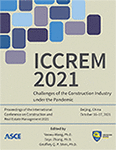Stakeholder Analysis in Urban Community Regeneration in China: The Case of Shenzhen
Publication: ICCREM 2021
ABSTRACT
Urban community regeneration has become an urgent urban problem in China due to the fast growth of economics and urbanization during past decades. With the characteristic of complexity, time consuming, and high uncertainty, urban community regeneration requires collaboration of stakeholder groups and individuals coordinating with a shared vision and common goals. Thus, stakeholder analysis can be an essential step to understand the interaction mechanism of stakeholder in urban community regeneration decision making. This paper aims to develop a research methodology to analyze stakeholders in urban community regeneration, using the case of Shenzhen. First, stakeholder analysis and social network analysis were proposed to be complemented as research methodology in the future study. Second, the stakeholders involved in different urban community regeneration processes were identified and their variations of participation were analyzed as well. Third, the expectations and demands of several types of stakeholder were compared. Finally, the pros and cons of Shenzhen model was discussed.
Get full access to this article
View all available purchase options and get full access to this chapter.
REFERENCES
Booher, D. E. (2004). “Collaborative governance practices and democracy.” National Civic Review, 93(4), 32–46.
Brugha, R., and Varvasovszky, Z. (2000). “Review article stakeholder analysis : a review.” Health Policy and Planning, 15(3), 239–246.
Burt, R. S., Minor, M. J., and Alba, R. D. (1983). Applied network analysis: a methodological introduction, Beverly Hills, CA, Sage Publications.
Couch, C., Sykes, O., and Börstinghaus, W. (2011). “Thirty years of urban regeneration in Britain, Germany and France: the importance of context and path dependency.” Progress in Planning, 75(1), 1–52.
Eden, C., and Ackermann, F. (1998). Making strategy, Thousand Oaks, CA, Sage.
Freeman, R. E. (2010). Strategic management: a stakeholder approach, Cambridge University Press, Cambridge.
Horisch, J., Freeman, R. E., and Schaltegger, S. (2014). “Applying stakeholder theory in sustainability management: links, similarities, dissimilarities, and a conceptual framework.” Organization and Environment, 27(4), 328–346.
Huang, P. (2018). Research on decision making of urban renewal project planning based on stakeholder theory, Chongqing, Chongqing University. (in Chinese).
Jiang, Y., Mohabir, N., and Ma, R. (2020). “Whose village? Stakeholder interests in the urban renewal of Hubei old village in Shenzhen.” Land Use Policy, 91(11), 104–111.
Leung, A. (2006). “Three-dimensional interactions of circular crack in transversely isotropic piezoelectric space with resultant sources.” Applied Mathematics and Mechanics English Edition Shanghai, 27(11), 1439–1449. (in Chinese).
Li, T. H., Ng, S. T., and Skitmore, M. (2012). “Conflict or consensus: an investigation of stakeholder concerns during the participation process of major infrastructure and construction projects in Hong Kong.” Habitat International, 36(2), 333–342.
Liu, Z., Zhu, Z., and Wang, H. (2016). “Handling social risks in government-driven mega project: an empirical case study from west China.” International Journal of Project Management, 34(2), 202–218.
Mitchell, R. K., Agle, B. R., and Wood, D. J. (1997). “Anticipating informed consent: an empirical approach.” Academy of Management Review, 22(4), 853–886.
Omidipoor, M., Jelokhani-Niaraki, M., and Moeinmehr, A. (2019). “A GIS-Based decision support system for facilitating participatory urban renewal process.” Land Use Policy, 88(8), 104–150.
Prell, C., Hubacek, K., and Reed, M. (2009). “Stakeholder analysis and social network analysis in natural resource management.” Society and Natural Resources, 22(6), 501–518.
Shen, Q., Wang, H., and Tang, B. S. (2014). “A decision-making framework for sustainable land use in Hong Kong’s urban renewal projects.” Smart and Sustainable Built Environment, 3(1), 35–53.
Wasserman, S., and Faust, K. (1994) Social network analysis: methods and applications, Cambridge University Press, Cambridge.
Wu, W., He, F., and Yi, Y. (2020). “Stakeholder analysis and social network analysis in the decision-making of industrial land redevelopment in China: the case of Shanghai.” International Journal of Environmental Research and Public Health, 17(24), 1–27.
Yung, E. H., Chan, E. H., and Xu, Y. (2014). “Community-initiated adaptive reuse of historic buildings and sustainable development in the inner city of Shanghai.” Journal of Urban Planning and Development, 140(3),78–86.
Zhuang, T., Qian, Q. K., and Visscher, H. J. (2019). “The role of stakeholders and their participation network in decision-making of urban renewal in China: the case of Chongqing.” Cities, 92(5), 47–58.
Information & Authors
Information
Published In
Copyright
© 2021 American Society of Civil Engineers.
History
Published online: Dec 9, 2021
Authors
Metrics & Citations
Metrics
Citations
Download citation
If you have the appropriate software installed, you can download article citation data to the citation manager of your choice. Simply select your manager software from the list below and click Download.
